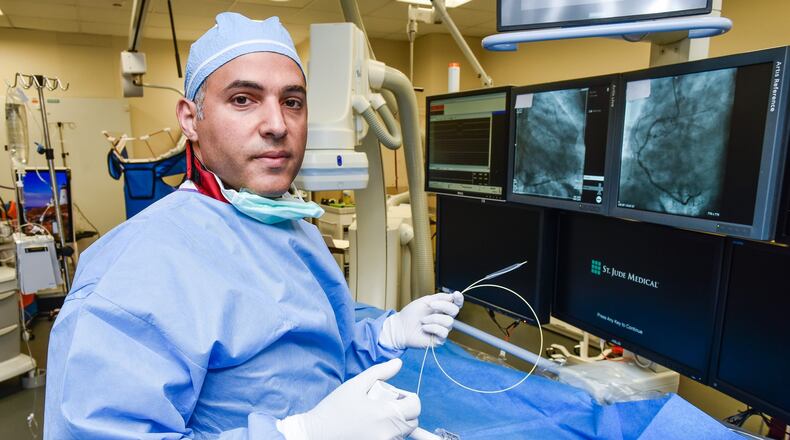Atrium, which is part of Dayton-based Premier Health, is the only hospital in Butler or Warren counties to receive the Gold or Gold Plus Quality Achievement Award.
“What it’s telling people is we’ve consistently demonstrated excellent ability to take care of cardiac patients and to do that in a timely fashion and have excellent outcomes from the time they come into the emergency room to the time that they leave the hospital,” said Dr. Mouhamad Abdallah, medical director of Atrium Medical Center’s Chest Pain Center and the hospital’s cardiac catheterization lab.
Every year, more than 250,000 people experience a heart attack, caused by a blockage of blood flow to the heart that requires timely treatment.
Kim Crout, a registered nurse and coordinator for Atrium Medical Center’s Chest Pain Center, said the hospital is working to let area residents know the signs and symptoms of a heart attack, and that the hospital is “fully prepared to take care of them and do it well.”
With Atrium’s Gold Status comes “decreased chance of mortality, or death, and also increased chance of having or maintaining their current quality of life,” Crout said.
Atrium Medical Center handles approximately 300 heart attacks or stent procedures each year, and performs between 50 and 100 bypass surgeries, Abdallah said. Complementary to that, the hospital also is an American College of Cardiology-accredited chest pain center.
“If you have chest pain today and you decided to go to your doctor, he or she may decide to do certain workup or certain tests,” he said. “At Atrium, we do the same thing, but we have very strict rules governing the way that we do them.”
RELATED: Freestanding ERs on the rise in region
MORE: Atrium Medical Center to expand services in new Liberty Twp. facility
Gold is the second highest level of recognition from the American Heart Association for facilities that receive severe heart attack patients, and Gold Plus is the association’s highest honor for this program. Nationwide, 78 hospitals received the Gold Award and another 66 hospitals received the Gold Plus Award, according to the heart association.
The hospital’s Gold Status, earned for excellence in the span of eight quarters, is a step up from its previous Silver Status, which was obtained based on outcomes over four quarters.
Earning the award is the result of being able to not only taking advantage of every opportunity to train to keep improving care, but also being able to have 15 people prepped and ready within 30 minutes to open a patient’s blockages prior to emergency cardiac surgery, Abdallah said.
MORE: Atrium Medical Center’s first decade characterized by growth
“It’s a big benefit for the community because in our field we say that ‘Time is muscle,’” Abdallah said. “Every minute that passes when you have a blocked artery, the heart is losing a lot of its muscles and it’s gradually dying away and the only way to reverse that is to open the blockage and reestablish blood flow to the heart.”
Abdallah said the hospital plans to continue its work and dedication to keep and improve its ranking with AHA, whose Mission: Lifeline program’s goal is to reduce system barriers to prompt treatment for heart attacks, beginning with the 911 call, to EMS transport and continuing through hospital treatment and discharge.
The Mission: Lifeline program provides tools, training and other resources to support heart attack care following protocols from the most recent evidence-based treatment guidelines.
Atrium Medical Center seeks to ingrain those lessons and “spread knowledge” of its own via weekly cath conferences and periodic lectures on not just chest pain, but also any new technology, Abdallah said.
“It’s a series of different theoretical protocols that are implemented into practice, and they way that you do it is by training all the staff and everybody in the emergency room from physicians to nurses on how to do these steps, and then subsequently the cath lab (on) how to do these steps,” he said. “The training happens in a variety of different forms but really just the idea of implementing something that it is so intricate and so complicated and making it happen is nothing short of a miracle.”
OTHER: New Middletown emergency department designed with seniors in mind
RECOGNIZING A HEART ATTACK: Catch the signs early
Although some heart attacks are sudden and intense, most start slowly, with mild pain or discomfort. Pay attention to your body — and call 911 if you feel:
- Chest discomfort. Most heart attacks involve discomfort in the center of the chest that lasts more than a few minutes, or that goes away and comes back. It can feel like uncomfortable pressure, squeezing, fullness or pain.
- Discomfort in other areas of the upper body. Symptoms can include pain or discomfort in one or both arms, the back, neck, jaw or stomach.
- Shortness of breath with or without chest discomfort.
- Other signs may include breaking out in a cold sweat, nausea or lightheadedness.
SOURCE: American Heart Association
About the Author

